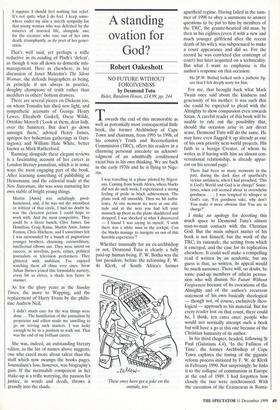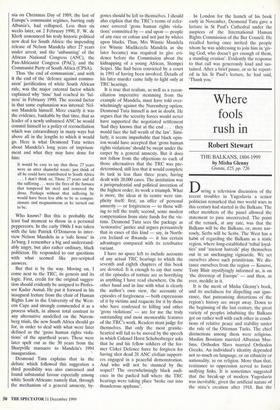A standing ovation for God?
Robert Oakeshott NO FUTURE WITHOUT FORGIVENESS by Desmond Tutu Rider, Random House, £14.99, pp. 244 Towards the end of this memorable as well as potentially most consequential little book, the former Archbishop of Cape Town and chairman, from 1995 to 1998, of his country's Truth and Reconciliation Commission (TRC), offers his readers in a charming personal anecdote an acknowl- edgment of an admittedly conditioned racist bias in his own thinking. We are back in the early 1970s and he is flying to Nige- ria:
I was travelling in a plane piloted by Nigeri- ans. Coming from South Africa, where blacks did not do such work, I experienced a strong feeling of pride in black achievement. The plane took off smoothly. Then we hit turbu- lence. At one moment we were at one alti- tude and at the next you had left your stomach up there as the plane shuddered and dropped. I was shocked at what I discovered — I found I was saying to myself, 'I wish there was a white man in the cockpit. Can the blacks manage to navigate us out of this horrible experience'?
Whether unusually for an ex-archbishop or not, Desmond Tutu is clearly a fully paid-up human being. P. W. Botha was the last president, before the reforming F. W. de Klerk, of South Africa's former 'These ones have got a joke on the outside, too.'
He [P.W. Botha] looked such a pathetic fig- ure that I felt deeply sorry for him.
For me, that brought back what Mark Twain once said about the kindness and generosity of his mother: it was such that she could be expected to plead with the Almighty to show compassion even towards Satan. A careful reader of this book will be unable to rule out the possibility that, should the occasion arise in any direct sense, Desmond Tutu will do the same. He may have even flagged it up already as one of his own priority next-world projects. His faith in a benign Creator, of whom he writes as if having with him an almost con- versational relationship, is already appar- ent on his second page:
There had been so many moments in the past, during the dark days of apartheid's vicious awfulness, when I had preached, 'This is God's World and God is in charge!' Some- times, when evil seemed about to overwhelm goodness . . . I was tempted to whisper in God's ear, 'For goodness sake, why don't You make it more obvious that You are in charge?'
I make no apology for devoting this much space to Desmond Tutu's almost man-to-man contacts with the Christian God. But the main subject matter of his book is not himself, but the work of the TRC, its rationale, the setting from which it emerged, and the case for its replication elsewhere. It could well make a compelling read if written by an academic, but my guess is that, so written, its appeal would be much narrower. There will, no doubt, be some paid-up members of atheist persua- sion who will dismiss No Future Without Forgiveness because of its evocations of the Almighty and of the author's recurrent statement of his own basically theological — though not, of course, exclusively theo- logical — approach to his material. But for every reader lost on that count, there could be, I think, ten extra ones: people who would not normally attempt such a book but will have a go at this one because of the Christian humanity of its author.
In his third chapter, headed, following St Paul (Galatians 4.4), 'In the Fullness of Time', the former Archbishop of Cape Town explores the timing of the gigantic reform process initiated by F. W. de Klerk in February 1990. Not surprisingly, he links it to the collapse of communism in Europe at the end of 1989. I had forgotten how closely the two were synchronised. With the execution of the Ceausescus in Roma- apartheid regime. Having failed in the sum- mer of 1998 to obey a summons to answer questions to be put to him by members of the TRC, the granite-hearted old man, by then in his eighties (even if with a new and much younger girlfriend after the recent death of his wife), was subpoenaed to make a court appearance and did so. For the record he was convicted (for contempt of But what I want to emphasise is the author's response on that occasion: nia on Christmas Day of 1989, the last of Europe's communist regimes, barring only Albania's, had collapsed. Less than six weeks later, on 2 February 1990, F. W. de Klerk announced his truly historic political new deal for South Africa: the impending release of Nelson Mandela after 27 years under arrest, and the 'unbanning' of the African National Congress (ANC), the Pan-Africanist Congress (PAC), and the Communist Party of South Africa (CPSA).
Thus 'the end of communism', and with it the end of the 'defence against commu- nism' justification of white South African rule, was the major external factor which explained why 'time' had reached its 'ful- ness' in February 1990. The second factor in that same explanation was internal: Nel- son Mandela himself. More exactly it was the evidence, bankable by that time, that as leader of a newly unbanned ANC he would commit himself to a policy of reconciliation which was extraordinary in many ways but above all in the lengths to which it would go. Here is what Desmond Tutu writes about Mandela's long years of imprison- ment and what they may have done for him:
It would be easy to say that those 27 years were an utter shameful waste: just think of all he could have contributed to South Africa . I don't think so. Those 27 years and all the suffering ... were the fires of the furnace that tempered his steel and removed the dross. Perhaps without that suffering he would have been less able to be as compas- sionate and magnanimous as he turned out to be.
Who knows? But this is probably the least bad moment to throw in a personal peppercorn. In the early 1960s I was taken with the late Patrick O'Donavon to inter- view Nelson Mandela in a 'safe house' in Jo'burg. I remember a big and understand- ably angry, but also rather ordinary, black politician. He responded to our questions with what seemed like pre-scripted answers.
But that is by the way. Moving on, I come next to the TRC, its genesis and its logic. First, credit for the original sugges- tion should evidently be assigned to Profes- sor Kadar Asmal, He put it forward in his inaugural lecture from the chair of Human Rights Law in the University of the West- ern Cape and strongly commended it as a process which, in almost total contrast to any alternative modelled on the Nurem- berg trials, the new South Africa should go for, in order to deal with what were later defined as the 'gross human rights viola- tions' of the apartheid years. These were later spelt out as the 30 years from the Sharpville massacre to Mandela's 1994 inauguration.
Desmond Tutu explains that in the debate which followed this suggestion a third possibility was also canvassed and found substantial favour especially among white South Africans: namely that, through the mechanism of a general amnesty, by-
gones should be left to themselves. I should also explain that the TRC's terms of refer- ence covered 'gross human rights viola- tions' committed by — and upon — people of any race or colour and not just by whites upon blacks. Thus, Mrs Winnie Mandela (or Winnie Madikezela Mandela as she later became) was required to give evi- dence before the Commission about the kidnapping of a young African, Stompei Seipei. She had been convicted by a court in 1991 of having been involved. Details of his later murder came fully to light only at TRC hearings.
It is true that realism, as well as a recon- ciliation imperative stemming from the example of Mandela, must have told over- whelmingly against the Nuremberg option. Desmond Tutu himself is not in doubt. He argues that the security forces would never have supported the negotiated settlement 'had they known that at the end ... they would face the full wrath of the law'. Simi- larly, it seems improbable that black opin- ion would have accepted that 'gross human rights violations' should be swept under the carpet by a general amnesty. But it does not follow from the objections to each of those alternatives that the TRC was pre- determined, still less that it would complete its task in less than three years, having dealt with 20,000 cases. The institution was a jurisprudential and political invention of the highest order, its work a triumph. What is more, the ideas at its centre were sim- plicity itself: first, an offer of personal amnesty — or forgiveness — to those will- ing to tell the truth; second, some modest compensation from state funds for the vic- tims. Desmond Tutu sees the package as 'restorative' justice and argues persuasively that in cases of this kind — say, in North- ern Ireland or Rwanda — it has certain advantages compared with its retributive variant.
I have no space left to include accounts of any actual TRC hearings to which the seventh and eighth chapters of this book are devoted. It is enough to say that some of the episodes of torture are as horrifying as anything I have read elsewhere. On the other hand and in line with what is clearly the author's own view, the accounts of episodes of forgiveness — both expressions of it by victims and requests for it by those who have confessed to killing and other 'gross violations' — are for me the truly outstanding and most memorable features of the TRC's work. Readers must judge for themselves. But only the most granite- hearted will fail to be moved by the speech in which Colonel Horst Schobesberger asks that he and his fellow soldiers of the for- mer Ciskei Defence force be forgiven for having shot dead 28 ANC civilian support- ers engaged in a peaceful demonstration. And who will not be stunned by the sequel? The overwhelmingly black audi- ence in the packed hall where the TRC hearings were taking place 'broke out into thunderous applause'. In London for the launch of his book early in November, Desmond Tutu gave a lecture in St Paul's Cathedral under the auspices of the International Human Rights Commission of the Bar Council. He recalled having once invited the people whom he was addressing to join him in 'giv- ing God, who doesn't get enough of them, a standing ovation'. Evidently the response to that call was generously loud and sus- tained. After a brief pause, or so he report- ed in his St Paul's lecture, he had said,. 'Thank you.'



























































































 Previous page
Previous page